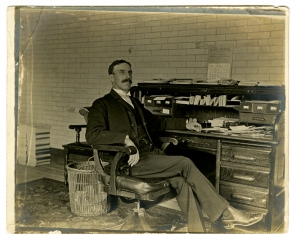dent to enable it to give greater attention to teacher training courses.
The Seminary failed to keep pace with the College in growth or performance. A major reason seems to have been the practice of admitting many poorly prepared students, several of whom enrolled in the abbreviated English course as an easy academic short cut to the ministry. In 1918 provision was made for such students by establishing a four-year course for non-college graduates to be taught by both Seminary and College faculties which would lead to the Bachelor of Theology degree. Further accommodation came in 1919 when the requirements for the Bachelor of Divinity degree, hitherto totaling seven years of college and theological work, were reduced to six and non-college men were admitted to the program.
Changes in the Seminary included the resignation of Dr. Sylvester Burnham as Dean in 1910 and the appointment of William H. Allison, A.B., Harvard, ’93, and a Chicago Ph.D., as his successor and Professor of Ecclesiastical History. Dr. Allison was followed in 1915 by John F. Vichert, a former student at MacMaster University, Hamilton, Ontario, and Chicago, who taught Theology. Dr. Hinton S. Lloyd, for thirty-eight years Corresponding Secretary of the Baptist Education Society and, in effect, its chief officer, resigned in 1915 to be succeeded by Dean Vichert. Frank A. Starratt, A.B., Acadia, ’92, was Professor of Theology from 1909 to 1919 and Dr. William M. Lawrence, ’70, former President of the University Board of Trustees, in 1912 became Lecturer in Christian Ethics.
Though the Library did not play as vital a part in the educational process as later, this resource of the University nearly doubled its holdings in the Bryan period, growing from about 50,000 volumes to more than 90,000. Dr. David F. Estes, who had retired from the Seminary in 1920 as Professor of New Testament, retired as Librarian the next year. His successor was Charles W. Spencer, the former Professor of History who had resigned in 1905 and now returned after teaching at Princeton and the University of Nevada and receiving his Ph.D. from Columbia. He was the first full-time University Librarian. Perhaps best known on the staff were Miss Alice A. Guller, Circulation Librarian, who came in 1914 and Miss Lida C. Vasbinder, Reference Librarian, who came a year later; both will be remembered for their generous assistance to generations of students and faculty.
` After several years of decline Colgate Academy closed its doors in







